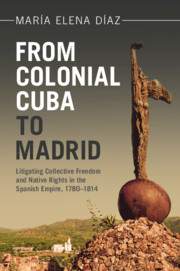 From Colonial Cuba to Madrid
From Colonial Cuba to Madrid Published online by Cambridge University Press: 14 November 2024
The chapter examines the distinctiveness of this composite freedom suit; the unorthodox Afro descendant community that took it to the highest imperial tribunal in Madrid; and the larger historical context that triggered the legal action in the early 1780s. It lays out the significance of the notions of “collective freedom” and “natives of a pueblo” deriving from colonial customary practices and from political, social, and juridical discourses rooted in the Spanish Atlantic world here reworked into novel proposals that challenged the approaching tsunami of slavery expansion in Cuba and the Atlantic world amid the Age of Revolutions, and it even presented a colonial alternative to slave-based plantation and extractive regimes. Linkages are made between the local, colonial, and imperial levels in which legal and political mobilizations unfolded. The chapter also surveys the various historiographies of slavery, race, Afro descendants, Indians, and law, politics and society that intersect in this study and discusses the sources and archives on which the study is based.
To save this book to your Kindle, first ensure [email protected] is added to your Approved Personal Document E-mail List under your Personal Document Settings on the Manage Your Content and Devices page of your Amazon account. Then enter the ‘name’ part of your Kindle email address below. Find out more about saving to your Kindle.
Note you can select to save to either the @free.kindle.com or @kindle.com variations. ‘@free.kindle.com’ emails are free but can only be saved to your device when it is connected to wi-fi. ‘@kindle.com’ emails can be delivered even when you are not connected to wi-fi, but note that service fees apply.
Find out more about the Kindle Personal Document Service.
To save content items to your account, please confirm that you agree to abide by our usage policies. If this is the first time you use this feature, you will be asked to authorise Cambridge Core to connect with your account. Find out more about saving content to Dropbox.
To save content items to your account, please confirm that you agree to abide by our usage policies. If this is the first time you use this feature, you will be asked to authorise Cambridge Core to connect with your account. Find out more about saving content to Google Drive.